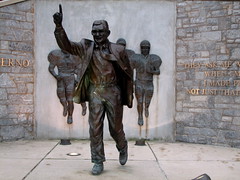This past week, the N.C.A.A. announced its sanctions against Penn State University in response to the Jerry Sandusky scandal. Among the sanctions was the decision that all of Penn State’s football victories from 1998 to 2011 were to be vacated. While there were varied reactions, Sociologist Gary Alan Fine reacted in an Op-Ed in the New York Times by stating that famous author George Orwell would be amused.
In his magnificent dystopia, “1984,” Orwell understood well the dangers of “history clerks.” Those given authority to write history can change the past. Those sweat-and-mud victories of the Nittany Lions — more points on the scoreboard — no longer exist. The winners are now the losers.
While Fine agrees that Penn State deserved sanctions and that the N.C.A.A. had an obligation to respond forcefully, he asks if re-writing history was the proper answer.
We learn bad things about people all the time, but should we change our history? Should we, like Orwell’s totalitarian Oceania, have a Ministry of Truth that has the authority to scrub the past? Should our newspapers have to change their back files? And how far should we go? Should we review Babe Ruth’s records? Or O. J. Simpson’s? Should a disgraced senator have her votes vacated? Perhaps we should claim that Joe McCarthy actually lost his elections. Or give victory to John Edwards’s opponent?
It is understandable that an organization wants its official history to reflect its hopes, but Fine argues that histories must properly reflect what happened at the time. Discomfort and shame honoring flawed people is understandable. Yet, “building a false history is the wrong way to recall the past. True and detailed histories always work better.”


Comments